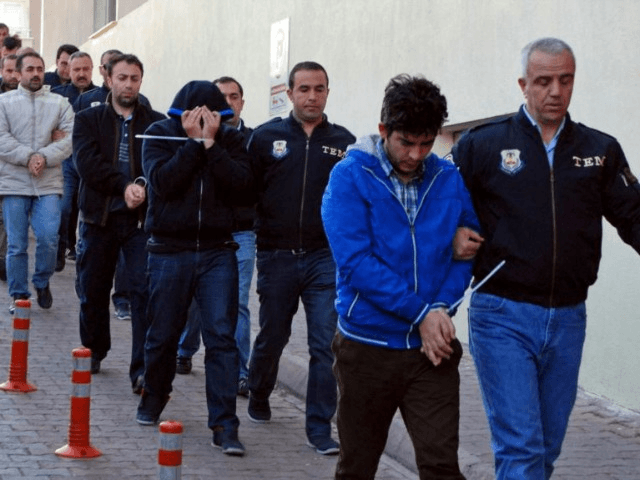The International Criminal Police Organization (Interpol) denied numerous reports circulating this week that it had ejected the Turkish government from its online database, following an attempt to brand tens of thousands of citizens believed to support Islamic cleric Fethullah Gulen as criminals.
The Turkish government claims Gulen, who runs a network of charter schools from self-imposed exile in Pennsylvania, organized the failed coup d’etat against president Recep Tayyip Erdogan last July. Gulen has repeatedly denied this claim, and American officials have said the Turkish government has not provided any evidence tying Gulen to the coup.
Interpol released a statement on Thursday in response to Turkish newspapers Yeni Safak, Hurriyet, and others publishing a report suggesting that Turkey had attempted to upload up to 60,000 individual profiles of people believed to have ties to Gulen, triggering Interpol freezing their account. According to Hurriyet, the Interpol statement said that “no access bans had been implemented for Turkey, including for people who had international warrants, over Interpol’s databases.”
“Interpol supports each and every one of its 190 members as part of security cooperation benefits. No access block has been implemented in Interpol’s databases, including for those who have international warrants in Turkey,” a spokesperson said.
The statement did note, however, that Interpol had rejected some notifications due to “non-occurence,” which Hurriyet describes as a notification in which Interpol cannot find enough evidence to suggest that the notification in question is necessary. Hurriyet cites “lacking documents” as a reason for a “non-occurrence” rejection of an application to the process. The statement did not specify how many of these instances have occurred, suggesting that the tens of thousands reported by Turkish media could be a mass “non-occurrence” rejection, not a ban on Turkey using the international system.
Original Turkish media reports claimed that Interpol had prevented Turkey from bombarding their system with unconfirmed criminal names for most of the past year because “an issue of trust” had surfaced between the government and Interpol. The pro-Erdogan Yeni Safak newspaper claimed the story proved that Gulen’s supporters—which the government calls the Fethullahist Terrorist Organization (FETO)—were “taking advantage” of Interpol.
“Thus, FETÖ fugitives could easily travel in many countries, particularly in Europe and the USA. The parallel structure members can travel with their current passport without being arrested when they flee abroad, because the system does not show any restriction on their names,” Yeni Safak claimed.
There is some evidence that the Turkish government did try to use the Interpol system to restrict the travel of anyone it believed to support Gulen. In April, the pro-government Sabah newspaper published a report shedding light onto Turkey’s plan to use Interpol against Gulen supporters.
“The Interpol liaison office of Turkish police spearheads efforts to bring back FETÖ members from abroad and it has succeeded in securing the extradition of 16 suspects so far from Asian and Middle Eastern countries plus Bulgaria,” the report noted, claiming “the Foreign and Justice Ministry, and the police and intelligence services” were all involved.
There is at least one known instance of Turkey urging Interpol to brand a Turkish citizen a criminal in order to hinder their travel as a result of public statements of support for Gulen, the case of Enes Kanter, a Turkish basketball star who plays for the NBA’s Oklahoma City Thunder. In May, authorities stopped Kanter at a Romanian airport and temporarily canceled his passport. Authorities acted on a Turkish arrest warrant issued for Kanter after the athlete repeatedly praised Gulen and criticized Erdogan on Twitter.
According to the Agence-France Presse, Turkey applied for an Interpol “red notice” for Kanter, which would compel an Interpol member nation to arrest him upon arrival. Kanter has not had any more travel issues, suggesting Interpol did not approve the request.
Turkey is not the only nation known to attempt to use Interpol against political opponents. A 2011 investigation found that nations like Iran, Russia, and Venezuela have attempted to brand political dissidents as criminals despite their lack of actionable criminal activity.

COMMENTS
Please let us know if you're having issues with commenting.